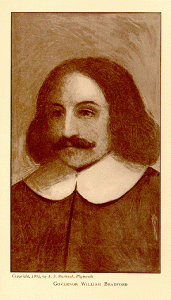The financiers who provided the funds for the Pilgrims’ voyage to America had as one of their requirements that the farming in the new settlement be set up communally. No individual or family was to have their own land. Rather, everyone had to work on communal land and receive an equal share of the crops. This wasn’t the Pilgrims’ idea, but they felt bound to the arrangement. For a while, at least.
 As governor, William Bradford had to make a decision at a critical point. It was becoming obvious this communal farming was far from ideal. He had difficulty convincing people to take responsibility for their allotted work time. There was no equivalency between how hard one worked and what one received in the end. A hard worker got no more than the person who decided to lean on his hoe half the time. Incentive was non-existent.
As governor, William Bradford had to make a decision at a critical point. It was becoming obvious this communal farming was far from ideal. He had difficulty convincing people to take responsibility for their allotted work time. There was no equivalency between how hard one worked and what one received in the end. A hard worker got no more than the person who decided to lean on his hoe half the time. Incentive was non-existent.
So Bradford, trying to stay within the guidelines to some extent, altered the rules to allow a certain portion of the fields to be given over to individual families to see if that made a difference. It certainly did. Bradford commented in his History of Plimoth Plantation that now people went out willingly to work, knowing that whatever effort they put into it, they would receive as a reward. He even noted that some of the women, who had previously found many excuses not to farm, now grabbed their children and took them to their private plot of land to labor.
The conclusion Bradford reached is instructive, not just for the Pilgrims’ circumstances, but for us today as well. He wrote,
The failure of this experiment of communal living, which was tried for several years, and by good and honest men, proves the emptiness of the theory of Plato and other ancients—that the taking away of private property, and the possession of it in community . . . would make a state happy and flourishing; as if they were wiser than God.
Let none argue that this is due to human failing, rather than to this communistic plan of life in itself. I answer, seeing that all men have this failing in them, that God in His wisdom saw that another course was fitter for them.
So here we have, in the early 1620s, a prime example of the failure of communism, more than two centuries before Karl Marx penned his Communist Manifesto. Private property, and the sense of personal responsibility that comes with it, is one of those principles with a Biblical basis. As I said, this understanding is still important for us today. May we learn from history; it’s foolish to repeat the failures of the past.
